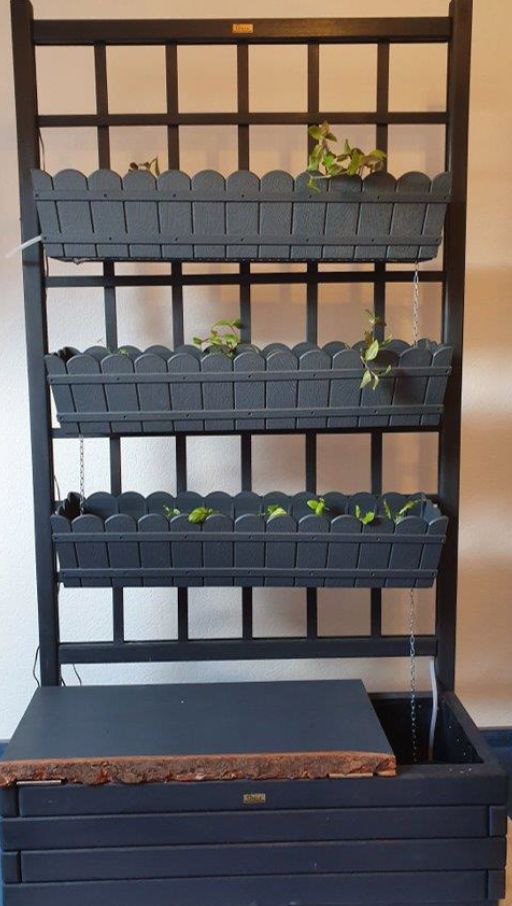Smart Hydroponics Interdisciplinary project in Engineering Management and Mechatronics

At Esslingen University's Göppingen Campus, third-year bachelor's students of Engineering Management and Mechatronics have come together in an interdisciplinary project, developing a concept for smart hydroponics. The concept, which focusses upon sustainability, details a system for the self-sufficient production of food in a small space, on the basis of NFT hydroponics.
The entire hydroponic structure covers a ground area of only 1,5 m x 0,5 m: there is room in this vertical tower for 48 plants to be cultivated. Through its compact design, this system can be optimally integrated into a tiny house, and the concept of urban farming can be put into practice. The system's modular construction can encompass any desired number of levels, and its wheels enable easy transport.
Project goals
Sustainability is one of the research goals at Esslingen University's Göppingen Campus. At the root of the Hydroponics Project is the concept of self-sufficient, hydroponic food production: this has been carried out in conjunction with the sustainable Tiny House Project.
What does hydroponics mean?
"Hydro" comes from the Greek "water", and "ponos" from the Greek "labour". Hydroponics are, thus, the process of growing plants with water. It is a special feature of hydroponics that plants are grown without soil, their roots hanging in a solution of water and dissolved nutrients.
What are the advantages of smart hydroponics?
A huge advantage of hydroponic systems is the significant reduction in water usage, compared with traditional agricultural methods. This is a result of the fact that the water circulates throughout the system, providing the plants with an optimal amount of nutrients. A further advantage is the space-saving design of this system: not only does each individual plant need much less space, as their roots are directly provided with nutrients and do not need to spread out in the earth, but the system itself can be built vertically. In addition, this kind of self-sufficiency is also available to city-dwellers, as it requires so little space. As the systems does not require earth, it neither makes a living area dirty not does itrequire weeding!
The project task
Project members were tasked with the conception and construction of a so-called „smart NFT system,“ which regulates itself using sensors and actors. NFT, or Nutrient Film Technology, is a particular kind of hydroponic system that circulates water to supply plants optimally with nutrients. A variety of plants are set in the modular construction: air filtering plants such as spider plants, as well as edible plants such as parsley, lettuce and basil. A lighting concept for plant growth is activated automatically as soon as the plants receive too little light, ensuring the productivity of the system in the winter months. In addition, the system can remotely monitor light, temperature, ph values and water level, and display these values in an app. If the system reports a low nutrient level, the pump will automatically add the necessary amount of nutrients to the water.
At this point, the analyses of the project's sustainability and economic viability have shown that the costs of this system are too high for the benefits accrued. From an environmental and social standpoint, however, there are many adantages. Not only can the user be assured of the quality of their food, but can also get joy from having this system in their home.
- Lisa-Marie Rusko, Patrick Stang, Sascha Flegel, Felix Maixner, Vladimir Samodelkin, Wend-lassida Elisée Yaméogo
Interested? Apply now! for the wintersemester 2025/2026
Get started
find a course